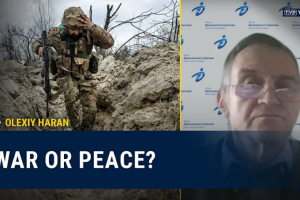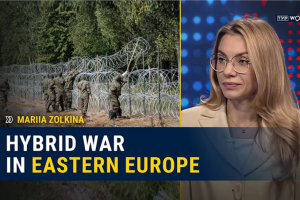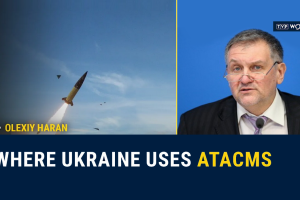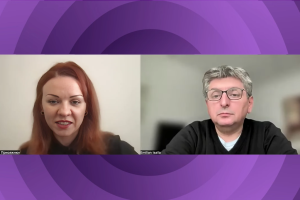Ukraine’s African gambit gains momentum with success against Wagner in Mali
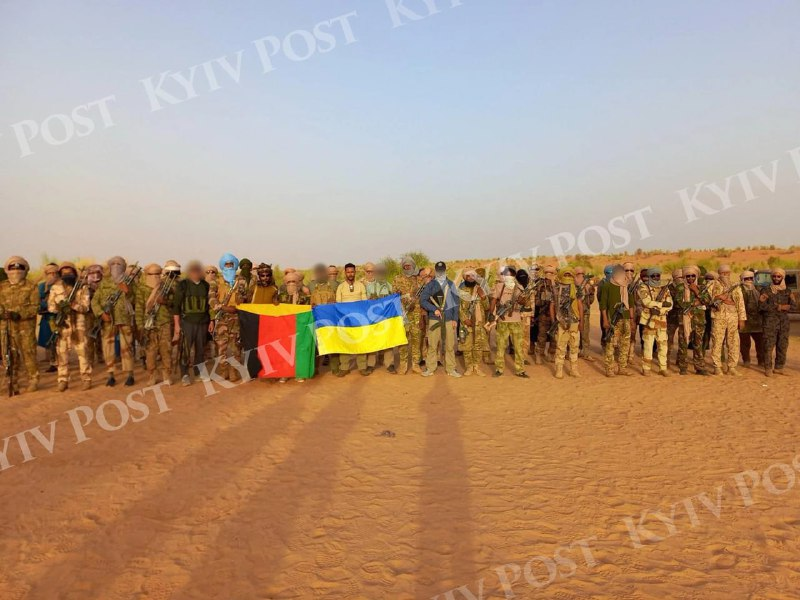
Source: Euromaidan Press
Ukraine flips Russia’s playbook, disrupting Wagner’s African gold operations and emerging as a surprise regional power broker. Security expert Omar Ashour notes the strategic shift: “The fight is global now. You cannot limit it to one theater.”
Russia’s Wagner mercenaries have possibly suffered their largest losses in Africa ever: on 28 July, Mali’s Tuareg rebels claimed a victory over government forces and the Russian paramilitaries helping them.
Ukraine’s intelligence agency announced that the Tuareg rebels received help – “information and not only information” – from Ukraine and announced other operations against Wagner in Africa to come.
Ukraine’s aid was, apparently, central to the victory of the rebels seeking autonomy for the Azawad region in northern Mali against the Wagner mercenaries, who, since 2021, have been supporting the military junta that seized power one year prior.
After years of battling Wagner, the Ukrainian army is uniquely positioned to defeat one of Russia’s most feared private military companies in Africa, where it helps the Kremlin prop up authoritarian regimes in exchange for resources and influence.
In the Mali incident, up to 80 Wagner fighters were killed, marking the group’s largest single-day loss on the African continent since beginning operations there.
Even if it’s less than 80, it is a highly significant loss for Wagner, Dr. Omar Ashour, security analyst, non-resident defense senior fellow at the Ilko Kucheriv Democratic Initiative Foundation, and author of the book “How ISIS fights,” told Euromaidan Press: “We’re talking about a small company size – if you lose one in one operation, that’s a big loss. Furthermore, these are elite soldiers, not the regular forces. They are advisors, trainers, the special force detachment.”
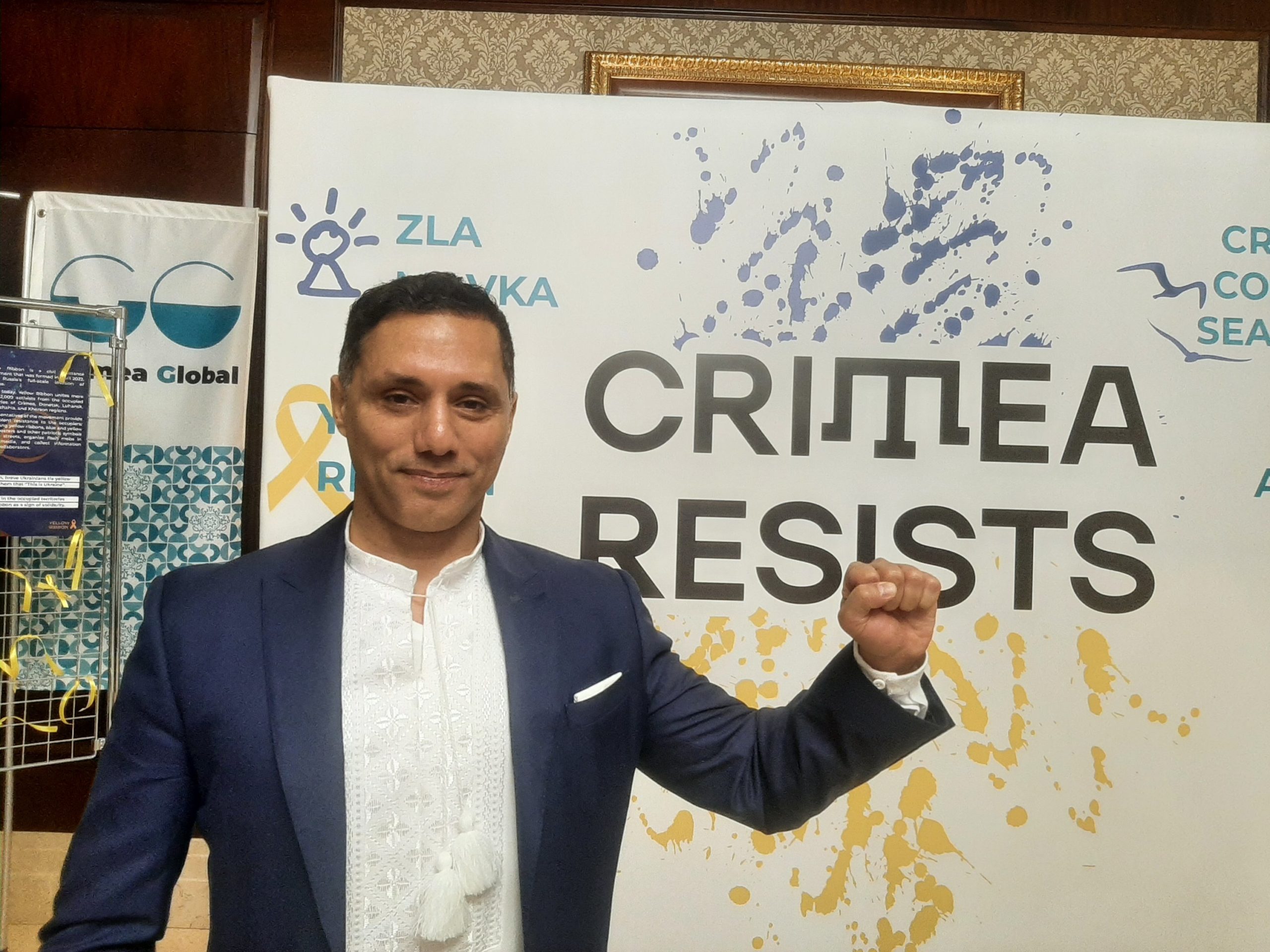 Omar Ashour at the Crimean Global Conference in Kyiv. Photo: Alya Shandra/Euromaidan Pres
Omar Ashour at the Crimean Global Conference in Kyiv. Photo: Alya Shandra/Euromaidan Pres
However, in Ukraine, Wagner had comparable losses daily, with the highest confirmed toll reaching 213 in a single day, according to Ukraine’s Center for Strategic Communications. During the six-month battle for Bakhmut, over 20,000 Wagner troops were killed, and even more were wounded.
We talked to Dr. Ashour to understand the meaning of Ukraine’s new African theater of war amid the ongoing Russian invasion.
Russia’s Wagner strategy in Africa and the Ukrainian response
In the conflict zones of Africa’s poorest nations, Russia offers military support and security to factions representing authoritarianism, corruption, and repression in exchange for extracting usually either gold, diamonds, or other minerals, turning these resources into missiles, rockets, and artillery shells that it then launches at Ukraine, Dr. Ashour tells.
Wagner is paramount to this strategy. Its operations in Africa were well-documented in the report “Blood Gold,” which estimates that by exploiting gold mines in Mali, Sudan, and the Central African Republic, the Kremlin has obtained over $2.5 billion in gold from Africa since Russia’s 2022 invasion of Ukraine.
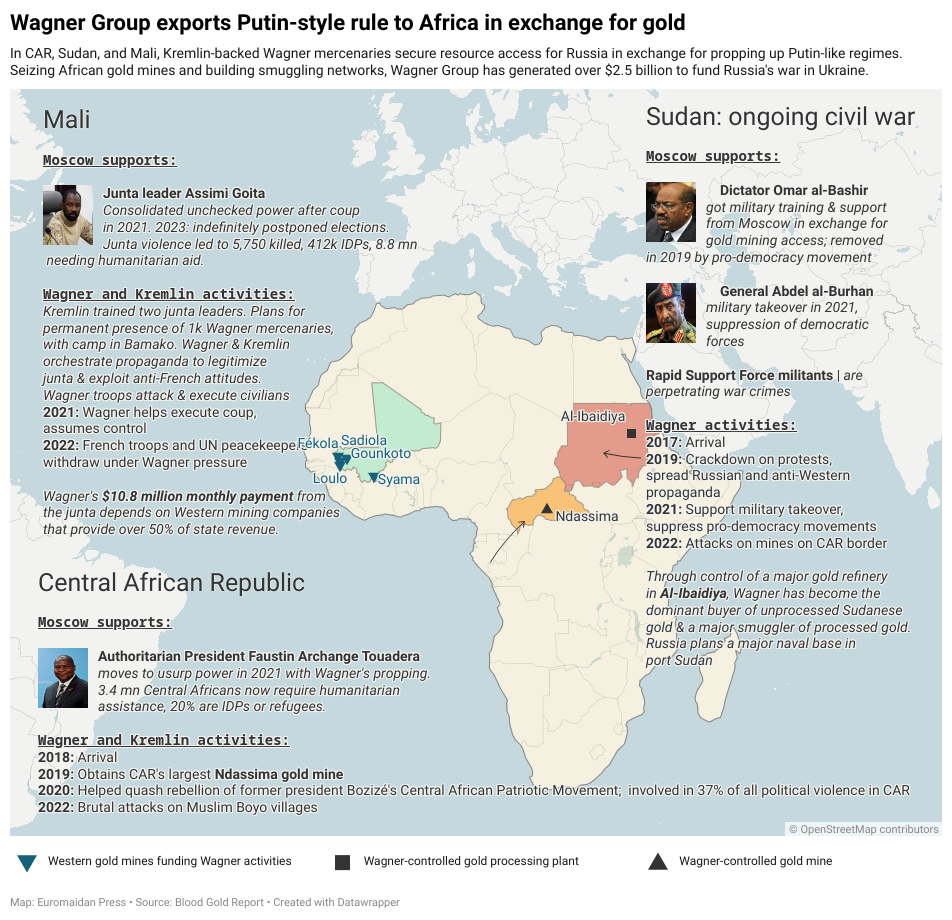 Source: Blood Gold: How Kremlin mercenaries loot Africa to wage war in Ukraine
Source: Blood Gold: How Kremlin mercenaries loot Africa to wage war in Ukraine
Specifically, in Mali, Wagner secured a lucrative cash-for-security deal with the ruling junta around 2021, reportedly receiving $10 million monthly. This deal is largely funded by taxes from international mining companies operating in the country.
Wagner has also been noticed in Libya, Mozambique, Madagascar, Burkina Faso, and Niger.
Meanwhile, Ukraine has been spotted helping anti-Wagner battles, most recently, in Mali, and in 2023-2024 in Sudan, where Ukrainian operatives provided intelligence and support to the Sudanese Armed Forces, conducted precision strikes and other military actions against Wagner units, including disrupting logistics and supply lines. There were also reports of Ukrainian intelligence activities aimed at dismantling Wagner’s economic operations, particularly in gold mining.
“Strategically, there is a clear shift in the Ukrainian security strategy in areas where the Russian Federation is trying to exert influence and extract resources, and therefore by default undermine Ukraine,” Dr. Ashour believes.
Although thus far, Ukraine’s strategy was more of a reaction to Russia’s actions, it will eventually become more active, Ashour says:
“Ukraine realized that the fight is not just in Europe. The world is not only Europe. Europe can put all kinds of pressure on Russia, and they will evade and find allies elsewhere – in Africa, South America, India, China, and the rest of Asia. This will basically undermine whatever Europe is trying to do.
So Ukraine will then have to expand and increase the number, quantity, and quality of its friends globally. The fight, unfortunately, is global now. You cannot limit it to one theater. Therefore, this is part of the overall global strategy for the defense of Ukraine that involves as many friends, partners, and allies as possible, even in countries where Russia is operating. You cannot just leave them for Russia: this will undermine the security of Ukraine and afterward. the security of Europe.”
Russia exploits its Soviet-era connections and influence to court African countries, but Ukraine is equally well-positioned to engage with these regions, as it has quite a few military and security links to Africa from those times as well.
“Some of the officers I interviewed for other pieces of research in places like Algeria and Egypt were trained by Ukrainian intelligence officers, air defense officers, or artillery officers,” Ashour adds.
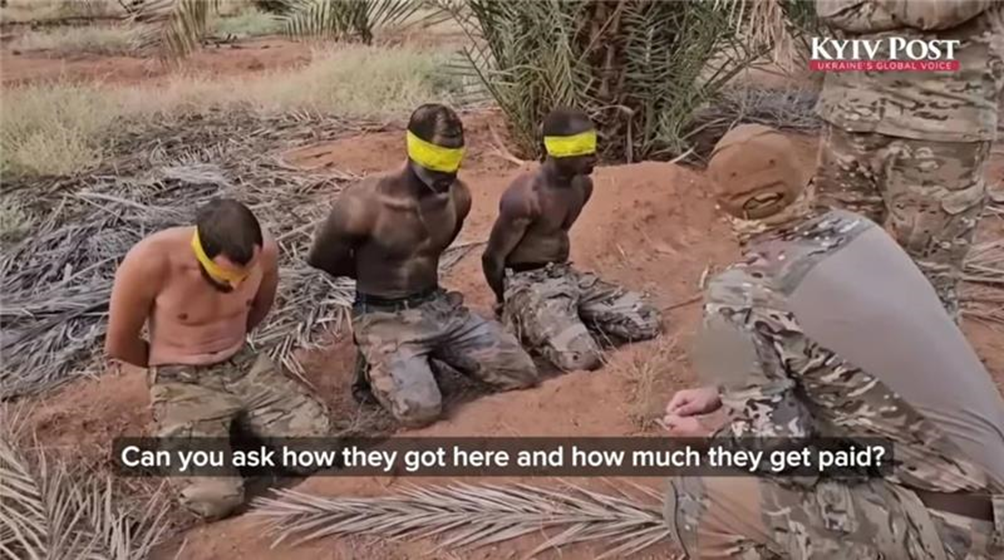
Wagner mercenary and two local recruits reportedly interviewed by Ukrainian special forces in Sudan. Photo: screenshot from Kyiv Post video
Intelligence, training, weapons: how Ukraine helps fight Wagner in Africa
Ukraine’s participation has been noticed in two locations: Sudan, where Ukraine supports the government forces against Russia-aided paramilitaries, and now, most recently, Mali, where Ukraine aids anti-government rebels fighting against the Wagner-backed junta.
Either Ukrainian officials have mentioned the assistance, or the helped groups have publicly thanked Ukraine, such as the Sudanese special forces, which sent greetings to Ukraine’s intelligence chief Kyrylo Budanov on his birthday.
According to Omar Ashour, the father of the leader of these Sudanese special forces was also trained by Ukrainian officers
Ukraine could have selected Sudan and Mali for anti-Wagner actions due to the significant resources that these countries provide the Kremlin, Dr. Ashour believes. In Sudan, Wagner gains access to vast amounts of gold through smuggling operations, and Mali pays Wagner a reported $10 million monthly, half of which is provided by Western mining companies operating in the country. But it’s also about finding the right partners: apparently, in Sudan and Mali, Ukraine succeeded in finding allies.
What specific aid could Ukraine have given? Intelligence support and training are two major options.
Intelligence includes information about the units of the Wagner group, their training, their movement, how they fight, what type of tactics they use, their techniques, tactics, and procedures, and some of the weapons systems. As well there is apparently some support in terms of weapon systems like MANPADS, ATGMs, and perhaps also some drone tactics and drone surveillance, Dr. Ashour believes – however, these are still unconfirmed reports.





